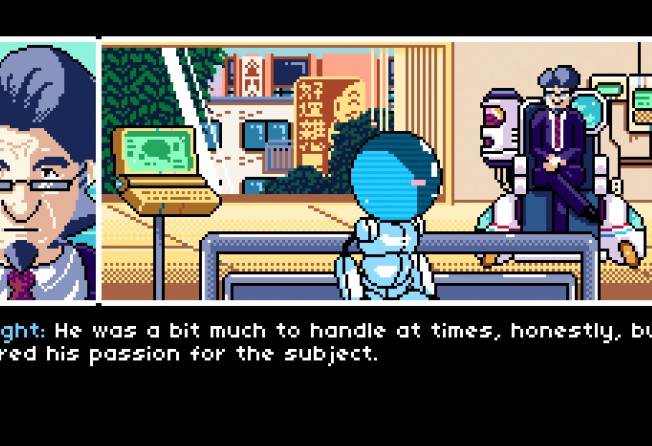
Game reviews: Read Only Memories and The Park
ROM explores familiar Blade Runner-ish territory in a pretty gripping way while The Park is an impressively sinister frightener, for the most part


MidBoss

Recent casting announcements for the Blade Runner sequel have all but made that somewhat precarious film a reality. For all its shortcomings as a guaranteed cash cow, it has at least put the spotlight back on the cyberpunk genre – case in point, Read Only Memories, a Kickstarter-funded game that for PC, Mac and Linux that takes heavy inspiration from the cult sci-fi classic.
The game feels straight out of the film’s 1980s era, a classic point-and-click adventure that employs 16-bit graphics and a brilliant chiptune soundtrack by hip-hop composer 2 Mello. The story also takes heavy doses of neo-noir as it explores themes of crime, technology and what it means to be human.
Players take on the role of a journalist out to help an intelligent robot find its kidnapped creator, in a world where hybrid creatures, genetically engineered humans and other colourful characters hang out in futuristic bars, darkened alleyways and towering skyscrapers.
Much has been made about ROM’s queer inclusion: as would be expected in a futuristic world, the game is filled with personalities of the lesbian, gay, bisexual and transgender persuasions, and it works very effectively. As in real life, sexualities and genders are rarely overtly emphasised, and the story always takes centre stage, focusing on the game first, while handling its LGBT themes appropriately.
Gameplay mechanics are classic computer adventure-style – look, touch, talk, use – but developers MidBoss have cleverly taken the timeless concept and given it a modern twist. Frustrating searching is all but removed through interactive items being clearly displayed; looking or touching an item multiple times sometimes yields different results, and conversations use an RPG-like approach that sees you gaining information through careful questioning like a detective.
However, most impressive are the multiple story branches, leading to a number of alternate endings depending on how you play. This gives ROM a remarkable replay quality, especially considering how well drawn the characters are, leading fans back again and again to its thoroughly realised cyberpunk world.
ROM is many things at once – a cyberpunk thriller, a throwback to classic point-and-clicks, an LGBT-friendly adventure – and all of it comes together for a fun and friendly game that eventually explores deeper, darker themes. It might not have us fully primed for that Blade Runner sequel, but it’s certainly explored impressive possibilities.

Funcom

Haunted houses, abandoned towns, cabins in the woods – there’s a definite set of location tropes that are constantly overused in the horror genre, so it’s refreshing to see something like The Park. Amusement parks might not strike one immediately as scary, but there is something inherently sinister about them: rickety rides, constant carnival music, a foreboding feeling of fear and unease.
Developer Funcom has long been a cult favourite for such MMOs as Age of Conan and The Secret World, and The Park pares things down from its usually expansive output. It offers an experimental solo campaign, as gamers follow Lorraine, a single mother desperately searching for her lost son past the park’s closing time.
Straight up: this isn’t the Resident Evil or Silent Hill type of horror; there aren’t hordes of zombies to fight off or elaborate puzzles to solve. Gameplay is limited to simply picking up items or shouting out your son’s name, and realism here is key: you’ll spend more time reading newspaper clippings and searching through empty alleys than you will discovering oh-so-convenient clues.
The game builds pressure slowly, lulling you in to the park’s tragic history, before shocking you with a simple background sound. Audio and visual design are particularly effective, frights heightened through darkened corners, shadows across walls and the rustling of trees. The fear of the unknown here is far more terrifying than any massive monster could ever be.
That slow build is particularly impressive for the first few hours, but things take a noticeable dip as the game reaches its third act. Pacing becomes noticeably rushed, as the atmosphere suddenly changes from one of creeping tension to loud, cheap thrills. This isn’t to say it’s a particularly bad conclusion – just all the potential that was so cleverly created comes undone slightly as the game limps its way across the finish line.
Then again, we can’t really think of a horror story that doesn’t descend into exaggerated scares as it wraps up. It’s an unfortunate side effect of an often unoriginal genre. The Park is an impressive little PC game, and while its scares never turn out to be a means to an end, that doesn’t mean horror hounds won’t get a kick out of it